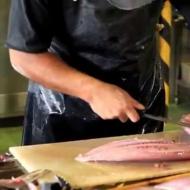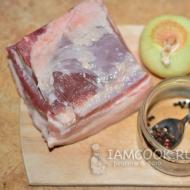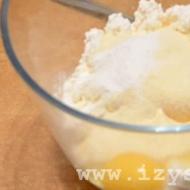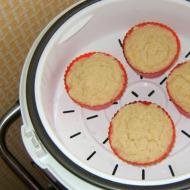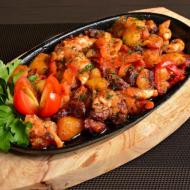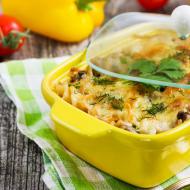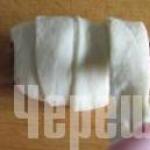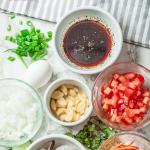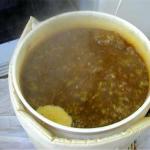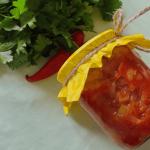
How to properly cook soft-boiled eggs. How to choose eggs. How to choose chicken eggs
Methods for preparing eggs are known, if not to everyone, then to many, but none of them lose their relevance throughout the day. At first glance, boiling eggs is a simple matter, but even here there are difficulties and pitfalls. Properly boiled eggs are the key to a successful and tasty dish that will delight the whole family.
Eggs are an incredibly nutritious and healthy product. Eating a few eggs for breakfast can easily fill your daily protein requirement. In addition to being eaten on its own, eggs are also an ingredient in various soups, salads, baked goods and other dishes. However, different recipes require different degrees of doneness for the eggs. How long to boil eggs? For any method there are certain requirements.


Make sure eggs are fresh
First of all, you need to make sure. Insufficiently fresh eggs can ruin the entire dish. Before wondering how long to boil an egg, you need to check if it is fresh. You can easily do this by placing it in lightly salted water.
The rotten one will float, the egg with a short shelf life will rise a little, and the freshest one will remain at the bottom. This stage is extremely important, since the freshness determines how long the eggs need to be boiled. For example, the freshest ones usually take a little longer to cook.
You should not boil eggs in a large container or over high heat. In this case, when boiling, the eggs will jump and hit the walls of the pan and each other - this increases the risk of cracks. A medium or small saucepan and slightly boiling water will be optimal for cooking - this way the eggs will be safe and sound.
Place in the “correct” water
You cannot put cold eggs straight from the refrigerator into hot, much less boiling, water. Due to a sharp change in temperature, the eggs will simply crack, and you risk going hungry.
This can be easily corrected by first rinsing the eggs in warm or hot tap water - this will keep them warm and prevent them from cracking during cooking. You can also put the eggs in cold water and gradually bring it to a boil - this method of cooking is called “cold setting”. This reduces the cooking time slightly.
You can add a pinch of salt to the pan. It will ensure rapid coagulation of the protein - so, even if the eggs crack, they will not leak out. You can also pierce the egg with a needle from its blunt end. Don't worry - the protein won't leak out, it's quite viscous. And this small hole will compensate for the pressure, and the egg will not crack.

Watch the cooking time carefully. It only takes a couple of minutes to make a mistake, and the egg will turn out completely different from what you planned. Please note that it is most difficult to boil an egg in a bag - this method requires careful control of time, as it is difficult to catch the desired consistency.
It’s true, it’s very easy to set eggs to boil and forget about them, but in this case they will be overcooked, become “rubbery” and completely inedible. Always time yourself when boiling eggs.
Contrary to erroneous belief, the color of an egg does not affect its taste at all. The color of the shell depends solely on the breed of chicken. In this case, it is worth paying attention to the yolk: the brighter one contains more nutrients.
Everyone has different tastes: some prefer semi-liquid whites and yolks, others like cooked whites and a tender runny yolk, while others only accept a fully cooked egg. Cooking methods vary by literally a few minutes, so you need to know exactly how long to cook the egg until it reaches the consistency you want.

Hard-boiled
A hard-boiled egg is the most common cooking option. In this case, both the yolk and the white are dense and fully cooked. Hard-boiled eggs are consumed in their pure form and also added to salads, sandwiches and other dishes.
There are two ways to boil hard-boiled eggs: cold and hot. When cold, as mentioned above, the eggs are placed in cold water and brought to a boil. The cooking time is 7-8 minutes from the moment of boiling.
Hot laying means eggs at room temperature. They are carefully placed in boiling water, usually with the help of a ladle, making sure that the eggs do not hit the sides or bottom of the pan. Boil hard-boiled eggs while hot for 8-10 minutes. Remember that the freshest eggs need to be cooked about 3-4 minutes longer!
For easy peeling, place the eggs in cold water immediately after boiling. It is also convenient to peel an egg by rolling it between your palm and the table - the surface of the egg will become cracked and the shell will be easily removed.

With this method of cooking, the egg turns out almost liquid, the white only slightly thickens around the edges. This cooking option is considered the most useful - the maximum nutrients are retained in the egg. A couple of soft-boiled eggs for breakfast will give you a productive morning and energy for the rest of the day.
They cook very quickly and easily, but require exceptional freshness of the products. For a soft-boiled egg to be ready, 2-4 minutes are enough, depending on the required consistency. You must first wash the eggs thoroughly to prevent any contamination of dirt and bacteria. Soft-boiled eggs are also boiled using a hot and cold mixture.
In a bag
As mentioned earlier, poaching an egg is one of the most difficult, but also exquisite, methods of preparation. Such an egg is obtained with a dense cooked white and a runny yolk, which appears as if “in a bag”. Typically, a similar result is achieved with 4-5 minutes of cooking from the moment of boiling.
You may not be able to poach an egg correctly the first time, but don't despair: this dish is worth trying again. In addition, it should be remembered that large eggs usually take 1-2 minutes longer to cook.
You can also prepare an egg in a bag in another way: cook for a minute, and then leave in still hot water for 7 minutes.
Features of boiling quail eggs
Recently, quail eggs are deservedly gaining popularity. Compared to chicken, their concentration of nutrients is much higher. For example, they contain much more protein, as well as vitamin D and A, which prevents the development of rickets.
Quail eggs never contain salmonella or cholesterol, so they do not cause allergies, and even small children can eat them. Quail eggs also help in the treatment of gastritis, pancreatitis and other intestinal diseases.
Since quail eggs are much smaller than chicken eggs, they therefore need to be cooked less and much more carefully. The soft-boiled cooking time for these eggs is 1-1.5 minutes; hard-boiled eggs need to be cooked for 3 minutes.
Conclusion
It's hard to imagine our life without eggs. They are an irreplaceable source of protein and nutrients. There are many different ways to cook eggs, and eggs are an ingredient in many dishes. Their most important advantage is their ease of preparation and the ability to consume them cooked. I hope you fell in love with eggs with all your heart after our article. Bon appetit!
Today we will talk about how to boil eggs so that they peel well. We will look at different cooking methods, as well as tricks in this process.
Eggs are one of the most commonly found foods in refrigerators around the world. This is due to the fact that there are many different options for preparing them. Each of them is radically different from the other not only in appearance, but also in taste factors. Eggs are eaten as an independent complete dish. For example, it could be fried eggs, omelet, soft-boiled. Eggs are often used as an ingredient in various salads. They are also stuffed with a variety of products (fish, crab sticks, cheese and others).
Types of preparation
How to boil eggs so that they peel well? Most people mistakenly believe that cooking them is easy and does not require special attention. However, to understand the depth of this misconception, it is worth familiarizing yourself with at least one method of preparing them. How to cook eggs correctly? Now we'll tell you.
Before giving a logical answer, it must be said that boiled eggs are of three types:
1) soft-boiled;
2) in a bag;
3) hard-boiled.
Rules
The differences between one type and the other two are in their final consistency and cooking time. We suggest returning to these questions later, but for now it would be advisable to talk about the general rules for boiling eggs. To begin with, let us highlight three main problems that arise with this method of preparing them:
How to boil eggs so that they peel well;
. how to prevent the formation of cracks, and subsequently the leakage of protein during cooking;
To avoid such troubles, which every housewife has probably encountered, you need to familiarize yourself with some simple tricks. So what's the best way to boil eggs? There are several ways that will help you.
Trick #1: Adding Salt to Water
Everyone salts eggs after they are cooked. But few people know that it is also necessary to salt the water in which they are cooked. This is done so that the eggs do not crack during the process and remain intact. Salt in this case acts as a sealer for small cracks, which can significantly spoil the final result.
Trick number 2: the freshness of the product affects the cooking process
The fresher the eggs, the more difficult it is to peel them. Even scientists cannot explain what this is connected with. However, the experience of many women has shown that this method works. If you have fresh eggs and plan to boil them, then it is better to postpone this idea for a few days.

It is important to know that it is advisable to boil soft-boiled eggs only when they are fresh. There are methods by which you can determine the age of an egg. The fresher it is, the longer it takes until it floats in the water. It also practically does not rotate around its axis. A fresh egg is heavier than an old one.
Trick #3: Piercing the eggs
This method is so effective that there is even a special piercing needle on the market. But you don’t have to rush headlong to the store to get it. You can use a needle or pin instead. The puncture is made in the lower part of the shell, where the air hole is located. It is important to ensure that the puncture is not large. Otherwise, water may leak into it, which will give the egg an unpresentable appearance.

Getting ahead of the question of why this is done, let's say that the puncture removes air, thereby preventing the formation of cracks on the egg and at the same time ensuring easy cleaning. This method is also used to get rid of dents on the surface of the finished product.
Trick #4: The Cooking Process
Now we will tell you how to boil eggs so that they are easy to peel. There are endless debates about what kind of water this should be done in: cold or hot. And these disputes are completely justified. Those who are wondering how to boil eggs so that they peel well should definitely answer that this should only be done in hot conditions. If you start in cold water, the protein will cook for a long time, sticking more and more to the shell.

By dipping eggs in boiling water, this can be avoided. But by deciding to boil eggs in hot water, you increase the risk of cracks forming significantly, and the yolk is also likely to shift from the center in different directions.
Trick #5: Refrigerating the Eggs
First, you need to bring the eggs to room temperature before you start cooking, rather than boiling them immediately after taking them out of the refrigerator. Secondly, after cooking, they should be cooled in cold water.
Trick #6: Cleaning
The last trick we'll talk about today is the egg peeling technique. This is easy to do, but you need to know and take into account some nuances in order to make this process as easy as possible. First you need to completely break the shell by rolling the egg on a flat surface. Then, for greater efficiency, you can peel the egg while holding it under running cold water.
Description of types of boiled eggs
Having learned all the tricks, you can return to the species. Let's consider what the consistency of each of them is and how long to cook the eggs after boiling.

- A soft-boiled egg has a fairly runny yolk and a set white. It turns out very tender. To cook soft-boiled eggs, you need to keep them in boiling water for no more than two minutes, first reducing the heat.
- An egg in a bag can be considered cooked correctly if the yolk has hardened around the edges and remains a little runny in the middle. The protein should be tender and snow-white. Cook for three minutes after the water boils.
- A hard-boiled egg, contrary to opinions, can also be spoiled. If you keep it in boiling water, the yolk shell will turn gray, and its consistency will become loose and crumbly. The protein becomes rubbery. This egg reaches the desired state in boiling water for 5-7 minutes.
A little conclusion
Now you know how to properly boil eggs. We looked at different types of cooking. By familiarizing yourself with these simple tricks and then using them in practice, you will avoid minor troubles that can ruin your mood. And also enjoy the wonderful taste and aesthetic appearance of boiled eggs.
“Not worth a damn!” - that’s what they say about some trivial matter.
But is it really that easy to boil an egg?
How to choose eggs for boiling
Eggs are a nutritious product. They are rich in iron, calcium, and vitamins.
Now there is no shortage of eggs. In any store you can buy both small and large ones. And on the market it is easy to buy not only chicken, but also duck and quail eggs.
But eggs are not always stored correctly. And sometimes there is a chance to buy a stale egg, especially in the summer heat. Therefore, you need to adhere to certain rules when buying eggs.
- The freshness of eggs is determined using an ovoscope. Therefore, the average buyer has to rely on luck. But in order not to buy rotten eggs, you need to buy them where they are stored in the refrigerator or at least in a cool place, and not in the sun and heat.
- The eggs should be the same size. Just because they are small doesn't mean they are bad. They were simply laid by young hens, and they contain the same amount of nutrients as large ones.
- Eggs must be clean and, if possible, free of blood stains and droppings.
- You should not buy cracked eggs, even if they are much cheaper than others. After all, microbes and pathogens can get inside through a damaged shell. For example, salmonella.
- At home, the freshness of eggs is checked in a simple way: dissolve a tablespoon of salt in a glass of cold water and drop a raw egg into it. If the egg is fresh, it will sink to the bottom. If the egg is several days old, it will float in the middle of the glass. Well, a stale egg will rise to the surface so much that it will peek out of the water.
- First, the eggs are carefully washed in warm water.
- Dip into boiling water.
- Cook them at a high boil. In order for the water to boil again faster after immersing the eggs in it, there must be enough water. If there is not enough water, the eggs will cool it so much that it will not be able to boil again for a long time.
Depending on the cooking time, eggs can be cooked soft-boiled, “in a bag” or hard-boiled.
How to boil soft-boiled eggs
- The eggs are dipped into boiling water.
- Cook for three minutes from the moment of boiling.
- They take it out of the water. Serve hot or cold.
In soft-boiled eggs, the yolk turns out to be semi-liquid, and the white resembles thick yogurt. These eggs are served on a special stand.
How to boil eggs “in a bag” (in the shell)
- The eggs are dipped into boiling water.
- Cook for 4–5 minutes, depending on the size.
This egg differs from a soft-boiled egg in that it has a dense white, inside of which there is a semi-liquid yolk.
If you peel it, the white is able to hold the yolk, but you cannot squeeze it.
Eggs “in a bag” are served to the table on a stand, and are also used to prepare various dishes.
How to boil eggs “in a bag” (without shells)
- Pour a liter of water into a saucepan and add 50 grams of vinegar and 10 grams of salt.
- Bring to a boil.
- The eggs are quickly released from their shells into the water.
- Reduce heat and cook at low simmer for 3–3.5 minutes.
- Using a slotted spoon, remove the finished eggs from the pan and transfer them to a bowl with cold, lightly salted water.
These eggs have a flattened shape.
They have a dense white with a slightly rough surface, and the yolk is semi-liquid.
Eggs, boiled “in a bag” without shells, are used in the preparation and decoration of fish, meat and vegetable dishes. They are also served in baskets made of puff pastry or butter dough.
How to hard boil eggs
- The eggs are dipped into boiling water.
- Cook for 8–10 minutes.
- Take them out of the pan and immediately immerse them in cold water so that they can be easily peeled.
Hard-boiled eggs are used both as an independent dish and as an ingredient in salads, appetizers, soups and other dishes.
How to Boil Eggs in the Microwave
You cannot cook eggs in their shells in this oven, as they may explode due to the steam that forms inside them.
But you can boil an egg without the shell.
Place 6 eggs in a large saucepan. Remove the eggs from the refrigerator and place them in a saucepan. Choose a pan that is large and deep enough so that the eggs are in a single layer (don't stack one on top of the other) and there is some space between them for them to move.
Pour enough water into the pan to cover the eggs by 2.5 cm. Place the pan in the sink and fill it with water at room temperature. The eggs should be covered with water up to 2.5 cm above their surface.
- The more eggs you want to boil, the more water you will need. If you are cooking more than 6 eggs, they should be covered with water 5cm above their surface.
Add vinegar or salt to prevent cracking. Add one teaspoon (5 ml) of vinegar or half a teaspoon of salt to prevent cracking. Salt also makes the shells easier to peel when the eggs are ready to eat.
Place the pan on the stove and bring the water to a boil. Place the pan on the stove and bring the water to a boil. You can leave the pan uncovered while you bring the water to a boil.
- If you notice a crack in the shell during cooking, continue the cooking process. A small amount of protein may leak through the crack. You don't have to worry about this, because once the egg is cooked, it can be eaten.
Turn off the stove and leave the eggs in the boiling water for 6-16 minutes. As soon as the water boils, turn off the stove, cover the pan with a lid and leave the eggs in the pan on the stove for 6-16 minutes, depending on what consistency you want your eggs to end up with.
- If you want the yolks to be translucent and runny inside, keep the eggs in water for 6 minutes.
- If you want to cook classic hard-boiled eggs (with a firm yolk), keep the eggs in water for 10-12 minutes.
- If you ultimately want boiled eggs with firm, runny yolks, keep the eggs in water for 16 minutes.
Drain the water and run the eggs under cold running water. Empty the pan and run the eggs under cold running water for a minute to complete the cooking process. Gently touch the shell to determine its temperature. The eggs should not be hot.
- To check the eggs for doneness, remove one egg using a slotted spoon, hold it under running cold water and cut it into two parts with a knife. If the yolk has not reached the desired consistency, keep the remaining eggs in the water for a couple more minutes.
- If you're worried about the eggs falling into the sink when you drain the water, try covering the pan with a lid so that there is a small hole. The water will drain through the hole and the eggs will remain in the pan.
- You can also cool the eggs by placing them in a bowl of ice water for 1 to 2 minutes.
Store unpeeled, hard-boiled eggs in the refrigerator for one week. If you need to store the eggs for a period of time, remove them from the water as soon as they are cool. Place them in an egg container. Thanks to this, they will not absorb the smell of other products. You can eat eggs for a week.
The eggs of any living creature, be it birds, turtles or other reptiles, are a source of essential microelements, vitamins, healthy fatty acids and protein for people of various traditions.
The richness of this food product is explained simply: it is a small chamber in which a full-fledged creature, ready for life, must form and develop.
The processes inside are organized by nature in such a way that they interact with each other as positively as possible, mutually penetrating and complementing the structure of future bones, muscles, and internal organs. This is a treasure trove of vitamins and beneficial elements for the human body. But to get the expected effect, it is important to know how to use this product correctly, or more precisely, how long to boil hard-boiled eggs.
Beneficial properties of properly prepared food
It is widely known that boiled food is the most digestible and healthy. Unlike fried or raw, it does not cause side effects such as heartburn, and it is almost impossible to get poisoned by it. Of course, provided that it is fresh and made from quality ingredients. This is especially true for animal food and eggs, among others. It’s not for nothing that babies prefer to feed this type of food.
Boiled chicken eggs occupy a special place in baby food.
Doctors have proven their positive effects on human health. The contents are almost completely absorbed, having a beneficial effect on the body.
The composition contains essential vitamins that promote growth and regeneration at the cellular level:
- D plays an important role in the absorption of calcium and phosphorus in the intestine;
- B1 (Thiamin) is needed for the normal absorption of carbohydrates, fats and proteins;
- B2 (Riboflavin) is essential for healthy skin, nails, hair and reproductive system;
- B5 (Pantothenic acid) necessary for the metabolism of fats, carbohydrates and the formation of vital fatty acids;
- B9 (Folacin) is also known as folic acid - an essential component in the synthesis of amino acids;
- B12m (Cobalamin) takes a major part in the formation of blood and nerve fibers, is needed for good metabolism and restoration of tissues of the gastrointestinal tract;
- A (Retinol) is good for bones, vision, skin, hair and the full functioning of the immune system
However, to get the right result, after consuming this product you should listen to the advice of doctors and nutritionists. According to them, the human body absorbs a cooked product better than a raw or otherwise prepared product. To achieve the maximum positive effect, you need to know how to boil hard-boiled eggs correctly. Because, for example, when overcooked, they become tasteless, hard, rubber-like, the yolk takes on a blue-green tint, and they negatively affect the functioning of the liver.
How to boil hard-boiled eggs correctly

First you need to rinse the shell under running water to remove dirt and
microbes It is better to first put them in a convenient container - a colander or a saucepan, placing them so that they do not knock against each other. After all, a strong jet will turn them over.
After this, they are placed in a cooking container and filled with cold water until completely immersed. If they are immersed, as some advise, in boiling or very hot water, the shell may crack and the contents will spill out. This will look unappetizing, and the finished protein will become watery and not as tasty.
After bringing the water to a boil, add a pinch of salt or a teaspoon of vinegar.
This is done in order to give strength to the shell during cooking, and vinegar can prevent the protein from leaking out if cracks form during cooking. After which the fire is turned down and the product is cooked until fully cooked. It is very important to know how long to boil hard-boiled eggs after boiling so as not to overcook them.
After all, as mentioned earlier, overcooked yolks become hard and have a harmful effect on the liver.
After boiling, contrary to popular belief, cooking should not be continued for five minutes, but kept in boiling water for much longer - 8-10. This is due to the fact that only small-sized eggs can be boiled in such a time, and good ones, of the highest category, require boiling for about ten minutes. Otherwise, the yolk will remain runny and the white will be half cooked.
After the specified time, the hot water must be drained and the contents quickly filled with cold water. For best results, it should be kept under running water for about three minutes, and then left to cool for some more time.
By preparing eggs in this way, you will get tasty, nutritious and healthy food, equally beneficial for adults and children.
How long does it take to boil a hard-boiled quail egg?
This delicacy has long been known for its benefits and excellent taste. In addition, quail eggs, unlike chicken eggs, are not susceptible to salmonellosis. They are considered dietary due to the reduced amount of cholesterol and the absence of possible allergies.
They contain the following microelements:

- calcium is the main component of bones and teeth, affecting their strength;
- zinc is important for the normal development of sperm and male hormones, the breakdown of alcohol, the synthesis of insulin and growth hormone;
- iron accelerates the process of oxygen exchange;
- potassium is a necessary element for proper muscle function, maintains their tone and elasticity;
- phosphorus – if it is deficient, problems with bones begin, and serious, unpleasant diseases may occur;
- Magnesium is needed for normal functioning of the heart, nervous system and gastrointestinal tract
Young mothers and girls who care about their health have a reasonable question: how many minutes should you boil hard-boiled eggs, especially quail eggs, so that they retain all their beneficial properties?
Indeed, both in the case of chicken and quail eggs, one rule applies - overcooked ones lose all vitamins and even become somewhat dangerous for the functioning of the digestive system.

